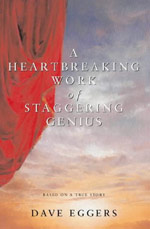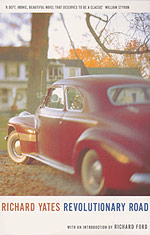Femme Fatale | |

| The first thing I want to say is: I've no idea how to review a book. Reviewers (proper ones) must take notes as they read. I certainly don't. Reviewing music is easier because all you have to do is replay the tune, stop, start etc. How can you go back over thousands of words? You can't. The second thing is that I out of the four novels I read so far this year, three of them contain the tragic deaths of women. This coincidental chain of events has made me quite miserable, right up to the point where I turned the final page of Michel Houellebecq's Atomised. The next day, Rupert recommened Dave Mitchells' No9Dream and I went out and bought it. I should have asked him if it contained the terrible deaths of any women, but having read twenty pages, I suspect that it doesn't. It's not that kind of book, thankfully. The sequence began with David Eggers' A Staggering Work of Heartbreaking Genius, which begins with the death of the author's mother, who is sofa-bound, having had her stomach removed, spitting foul-smelling green liquid. The first chapter nearly stopped my in my tracks, being so dark, so awfully tragic and depressing. The funny thing about the rest of the book is how it shifts into post-Copeland idle dreaming, and...what shall I call it...MTV generation semi-slacker philosophising? Frisbee-throwing seems to be significant. An MTV person is transformed into a shrink for a long section. There's an incident on a beach involving some Mexican kids...and, cleverly, the title alone means that people who have no idea what post-modernism or irony in a socio-cultural context might be will pick it up and have a look. I saw one woman in Waterstones doing this. She didn't look exactly...hip. I found this amusing. I'm sure Picador find it even more amusing. And rewarding. Having told his life story up to this point, I wonder what he can do next? Plain old fiction seems like a very old-fashioned option. |

| Richard Yates's Revolutionary Road first appeared back in 1961, and has just been reprinted by Methuen. It's a fantastic tale of America's new suburbia circa 1955, revolving around the life of a man who has what good Americans dreamed of: wife, two kids, car, good job. It's still the Classic Life, dreamed of by all Normal folk today, of course, but Yates tears it to shreds. Friendship amongst adult couples, domesticity, fatherhood, and work are all represented as unsatisfactory, fraught with problems. Intentionally or otherwise, Yates wrote a beautifully crafted critique of so-called 'normality' which reads as both great fiction with a potentially revolutionary sub-text. Read it. Atomised has been flying off the shelves, according to the assistant who sold me my copy. The hype is in full effect, but pervy types masquerading as readers of proper literature are no doubt drawn to it too because of the not unattractive, skimpily clad female on the cover. That said, the idea of a 'sexy' read which also deals with The Meaning of Life is a sale-pitch made in publishers heaven, I imagine. But the book isn't 'sexy'. Most sexual encounters, and there are plenty, are brief, crude, and crudely described. A modern Henry Miller? Hardly. I shouldn't have mentioned him. Houellebecq combines physics and fellatio as if they're somehow related. The personal lives of the two brothers and the science are also interwoven, but to be honest, I was absorbed by neither. He makes brief, sweeping statements about the state of society at points over the last forty years, but they don't sound convincing. The best parts involve derision of the New Age model for an alternative society, which seems to be his prime target. © Robin Tomens Read the next part of Robin's 'All The Time In The World' series here. |